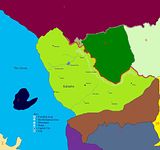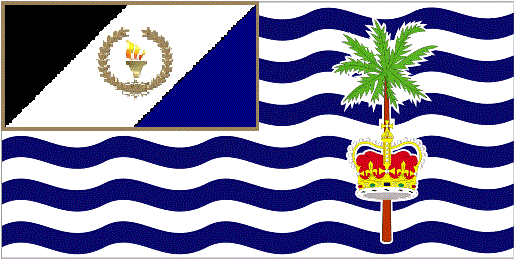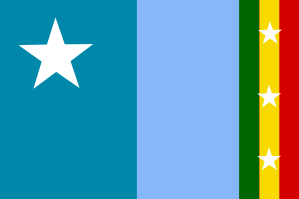
The Colonial Crisis
IC Situation:
Kalumba and all her neighbouring territories have been independent for almost 50 years, yet still depend heavily on their founder nations for trade and defence. But as the hold of the colonials weakens old feuds resurface and war looms on the horizon. Most nations are now led by democratic governments of all races, but some retain minority rule and others have been seized by military dictators. One spark could bring the entire region to war, and no one is willing to back down.
Relations are still strained from the last major war in which colonies were won and lost. The peace which this war brought about has left a legacy of de-militarised zones and fortified borders. Once considered defunct, but with full independence looming, governments pour money into securing their frontiers.
With animosity between nations and a large number of insurgent groups, most nations play an active role in subverting their enemies. Covertly and overtly. Some nations train and equip guerrillas and others send soldiers across borders to raid and destroy. Whatever the reason, war is looming and now it is your turn to choose the destiny of your colony…
OOC Information:
Think Africa in the 50s and 60s, as the Europeans hand back their colonies and bitter local wars are waged. But in this RP the colonials have handed back their colonies very slowly and still retain a measure of control, so will provide a degree of military aid and will also step in to stop any conflict turning into a major war.
However you can reject your colonial master and act as you wish, so a major war can still happen. But if you do so you will suffer heavily economically and will suffer from shortages and have to prevent a revolt from your people.
However I would appreciate it if you tried to stick to your nations role in ‘The War’ (see below) and the subsequent consequences. Si try not to act as though ‘The War’ did not affect your nation or your foreign relations and try and keep your alliances and trade realistic to the scenario.
I think there should be five basic forms of governments your nation should follow:
1. Military Dictatorship: After the colonials left a coup occurred and the Army seized power. If you choose this you will have a strong economy and military, but not a huge degree of support from your colonial master. Also you will have an insurgency in your nation.
2. Communist Rule: Idealistic communist state or Soviet Union style. Strong support from the majority of the population and a strong Army. Economy moderately powerful but a degree of corruption. Little or no support from the former colonial power.
3. Parliamentary Democracy: Probably part-settler, majority native run. Moderate strength Army and economy, but good backing from colonial master. Will suffer a minor insurgency and opposition from disaffected groups; settler or native.
4. Tribal Government: Thrown off the colonial yoke and returned to the ways before the settlers came. No economy but a decent military. Completely cut off from colonial power and little or no interaction with other states. People happy but ripe to be exploited by others.
5. Minority Government: Settlers still hold onto power. Small but powerful military and strong economy. However little backing from colonial master and will suffer insurgency and the probability of a civil war.
But if you can think of a different form for your nation than feel free to use that.
Populations: I think a maximum of 25 million per nation, except nation 3 who can have up to 40 million, and no more than 10% of those being settlers. Ethnic groups can be hugely varied and interact however you wish being friendly or openly hostile.
Technology: I think 1990’s technology is appropriate as the colonies will not have the money to acquire the latest technology fro their armies and industrial complexes. Small amounts of modern technology can be used but keep it within reason. There will be no nuclear weapons or any form of WMD.
RP Style: Diplomacy will be key in this RP as the new nations try to find their feet and gain a dominant position in the region. Wars will be small and localised and will be more border clashes than full-scale invasions for the early part of the RP. But after a moderate period war will become more and more unavoidable and will eventually break out.
Sign Up:
Nation Name: RP Colony name
Government Style: Choose an option and explain, or create your own.
Colonial Master: I suggest your own nation as this, but specify if someone else will RP them
RP Example: Not necessary, but I would like to see one if possible
Population: 25 Million maximum, specify number of colonials (no more than 10%)
Military Size: Keep it realistic and specify the basic equipment of your forces
Brief History of your Colony: Please detail the history of the Colony, it’s history under colonial rule, it’s independence, it’s relations with other nations in the region. Also include your colonies racial relations.
As you can clearly see there are 11 nations drawn onto the map, and 10 available to RP. You can claim any of them, bar Kalumba, and if only part of your nation is drawn you can choose to draw the rest yourself or just imply what else is in your nation. You can completely choose the terrain and wildlife of your nation, as long as it is realistic and I would prefer if you kept it African-ish wildlife for simplicity. Here is a basic description of a few nations’ dispositions and history since ‘The War’:
1: As an island nation will be relatively secure from attack, but will be very reliant on other nations for trade so could become isolated quickly. Stayed out of ‘The War’ but suffered heavy shipping losses when Kalumba vessels prevented trade with the mainland as they were supplying arms to nations 5 and 6. Trade suffered and they will have to rebuild their merchant fleet. Very secure government with minimal dissent. Small oil deposits and self-sufficient agriculture. Little industry but a powerful shipbuilding sector, the main maritime trade power.
2: Separate from the rest of the region by the sea will not be under any threat and could become a major trading nation with access to another regions resources. Played no role in ‘The War’ but lost some shipping to Kalumban Naval forces. Still trades with all nations. Secure government, little or no dissent. Huge agricultural sector and strong fishing sector. Eboinland
3: Probably the regional power, being exceedingly large and having access to the sea. Entered ‘The War’ when nations 5 and 6 invaded nation 4 to assault the final Kalumban redoubt. Drove their armies back, liberating Kalumba, and re-establishing peace in the region. Close ties to a Kalumba and established the current DMZs in the region, and enforces them strongly. Suffers some dissent from within supported strongly from without, especially by nations 5 and 6. Practically self-sufficient in all it’s needs, including oil and agriculture. Industry is the strongest in the region. Southern Cynocephali
4: Very small, will probably suffer aggression so will have to form alliances with others or rely heavily on it’s colonial master for support. Tried to remain neutral in ‘The War’ and did so until nations 5 and 6 invaded to try and capture what remained of free Kalumba. This brought nation 3 into the war and ended it. Has close ties to nation 3 and some ties to Kalumba. The government appears secure but there is popular unrest and all sides are bank-rolling politicians in hope of gaining valuable mineral concessions as the nation holds a great deal of natural resources. Albicia
5. Instigated ‘The War’ alongside nation 6 and they retain close ties. Began the war by invading Kalumba to gain access to the sea. When they reached a stalemate they invaded nation 4 to try and defeat the final Kalumban resistance but were defeated by nation 3. Not popular in the region but very popular with their people, only very minor dissent. Little industry or agriculture but the nations overwhelming supplier of oil. Nalaya
6. Started ‘The War’ alongside nation 5 and maintains close diplomatic and military links. Not popular but a huge agricultural power so forces trade with others, even Kalumba. The government is popular but many people would like to see a change in leadership and a less close relationship with nation 5. Guerrilla insurgency covertly supported by Kalumba and other states. Lydenburg
7: Very long borders, so very exposed to attack. But coastline will provide important trade. Joined nations 5 and 6 in ‘The War’ in hope of gaining the large seaport of Muzera in Kalumba. Kalumba forces kept Muzera in their hands and held back 7’s forces. Government unpopular but very popular with the army who crack down on any dissent extremely hard. Self-sufficient in all but oil.
8. Started ‘The War’ as a Kalumban ally but when nation 7 declared war on Kalumba they ceased all involvement. Mainly a desert nation it relied on the sea for most of it’s imports, being rich from large gold and silver mines in the desert south. Due to Kalumba’s naval dominance lost all sea trade and the majority of it’s fleet in ‘The War’. Government now looks to 5and 6 as allies but the people sea Kalumba as the ally. Dissent is common but no real signs of a revolt. Yanitza Accepted
9. An empty nation when it comes to resources but still rich from the huge timber resources available, while not top quality it is cheap and needed the region over. A staunch ally of Kalumba before ‘The War’ decided victory lay in peace and tried to negotiate with both sides. Government is popular but nations 5 and 6 pay for a small insurgency to try and turn the nation to their side.
10: Could be big or small, either a powerhouse or a target. Played no role in ‘The War’ and has little of value to export, but does not require much in import. Could become important in the region or merely an interested spectator to affairs. Livensola
When you add to the map you can also include up too 50% of your border as a fortified zone and can also include a de-militarised zone. Please do add your Capital and a few major cities onto the map. It is all done on MS Paint so shouldn’t be a major issue. Feel free to add rivers and mountains, but within reason so no perfect lines of defence formed by nature.
I hope that these scenarios will provide you with an interesting colony to RP and keep the whole RP realistic.
‘The War’
The war happened in 1981 when nations 5 and 6 invaded Kalumba in an attempt to seize control of the best ports in the region and the large diamond mines in Kalumba. Border clashes had been common for many years and when a Kalumban patrol crossed the border in pursuit of poachers and were drawn into a gun battle with nation 5’s security forces, nations 5 and 6 used this as an excuse to invade Kalumba. The small Kalumban Army was overwhelmed before an appropriate response could be acted out. Kalumban forces were driven back across the Bilto River and the Bechuane River into a redoubt formed on the banks of the Bechuane and around GwaBulawayo (Bulawayo) the regional capital. Also a small area of land around the port of Muzera was still in Kalumban hands. Nation 7 had also invaded Kalumba to try and gain Muzera but failed to breach the defences in place.
Meanwhile nation 8 ignored her alliance with Kalumba to try and gain from the war and nation 1 began to trade heavily with nations 5, 6 and 7 so the powerful Kalumban Navy began to launch unrestricted sinking’s of vessels in Kalumba pre-war waters. The war dragged on like this for two years before nations 5 and 6 decided on a plan to end the war. Their troops massed on the border of nation 4 and stormed across into the heart of free Kalumba. However in Kalumba’s bleakest hour nation 3 decided that nation 5 and 6 were becoming two powerful and invaded on the pretence of defending nation 4’s neutrality. Their superior army drove the invaders out of Kalumba but did not go on to conquer the aggressors. Instead they enforced a peace treaty and installed de-militarized zones around the borders of Kalumba and nation 4. They also prevented nations 5 and 6 from building military fortifications.
Neither side came out of the war too badly off, as the powerful Kalumban Navy survived and the sea ports were still intact. Nation 5 and 6 only suffered minor attacks on their home soil and lost little more than face. However neither side came out of the conflict with much credit. The Kalumban Army had been soundly defeated and she was criticised for her policy of sinking any merchant vessel in Kalumban waters or approaching the coast of nation 7. Nations 5 and 6 were condemned for their aggressive actions and have been mistrusted ever since.
With almost 30 years gone since the end of ‘The War’ the sabre-rattling has begun again and the old alliances resurface and any chance to score off a rival is snatched at and a repeat of ‘The War’ seems inevitable.
The Map:
I am rubbish with codes etc so if someone could post this bigger i would appreciate it, or advice on how to post it correctly.





